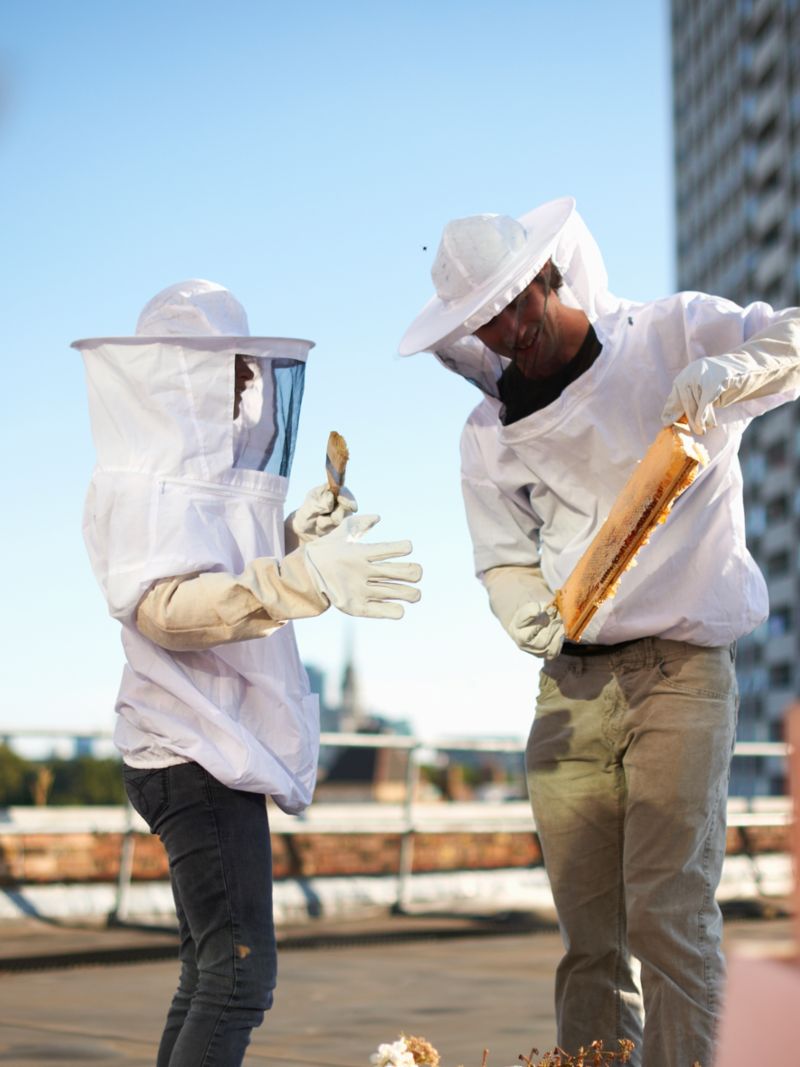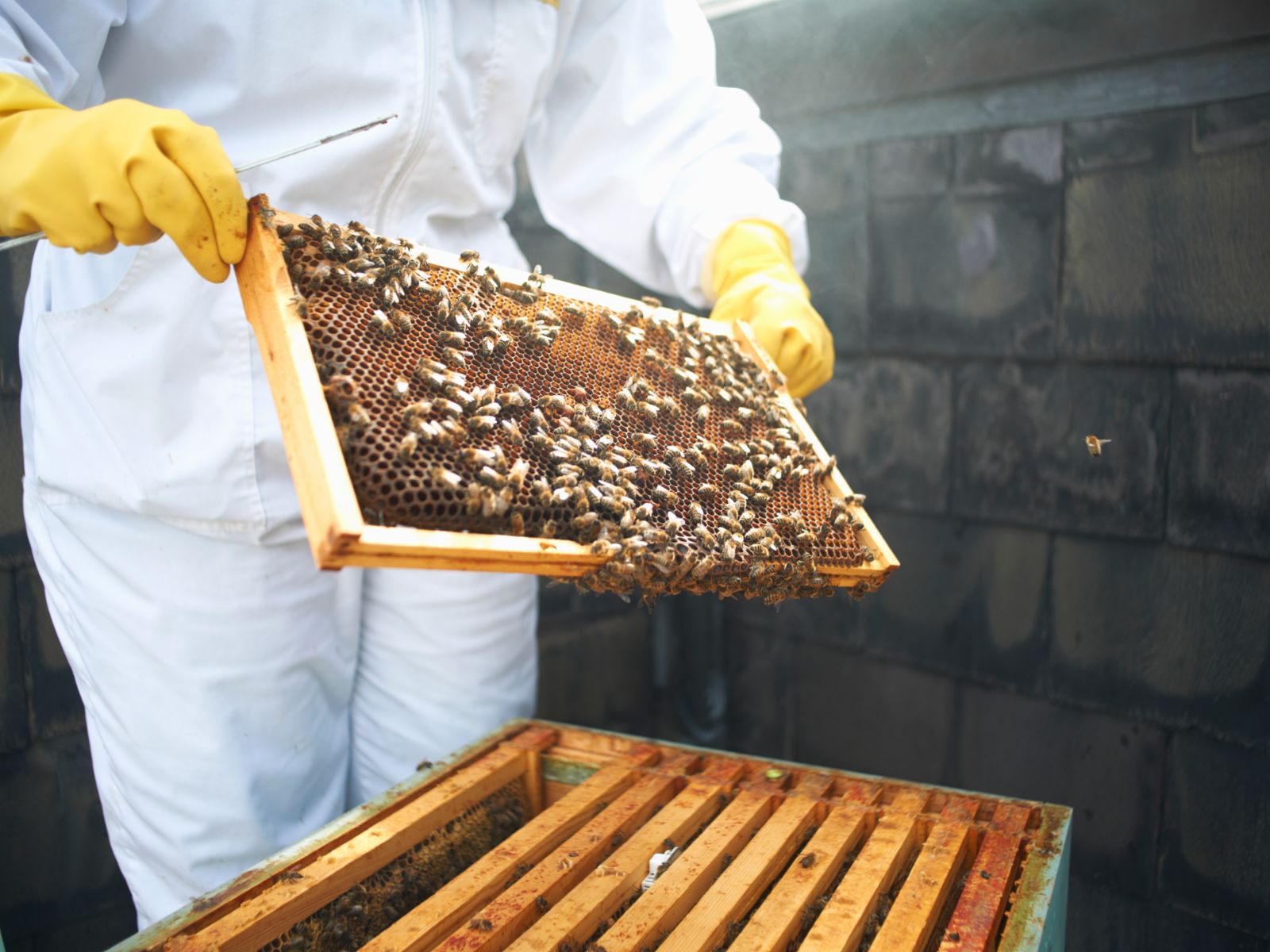Sustainability has many aspects, and many colours: sometimes it’s black and yellow. Just like the new residents who moved into the Emporio building, Union Investment’s headquarters in Hamburg, in summer 2020. Or more precisely, they moved onto Emporio: two bee colonies were installed on the roof of the building. That might seem like an odd thing to do, but it’s all part of the company’s commitment to sustainability, says Katja Tiedemann, asset manager at Union Investment: “Even small actions can make a big difference.”
Such actions include working with the Berlin-based “Stadtbienen” non-profit beekeeping association. Through the “Imke” project, Union Investment is creating homes for bees on top of urban buildings with the aim of boosting the bee population and increasing biodiversity in Germany. Both have been in decline for many years. The number of bee colonies in Germany has fallen by approximately 70 per cent in 70 years, from 2.5 million in 1952 to around 800,000 in 2020. The main reasons for this are the increase in agricultural monocultures, the use of pesticides and the spread of the varroa mite – a parasite from Asia that can cause entire honey bee colonies to collapse.

The number of bee colonies in Germany has fallen by approximately 70 percent in 70 years, from 2.5 million in 1952 to around 800,000 in 2020.

Economic consequences
As well as having an impact on the environment, the decline in the bee population also has economic consequences. Some 80 per cent of our crops and wild plants are pollinated by bees. Without their hard work, costs would increase if alternative pollination methods had to be used and the prices of agricultural products would rise. According to a study by the University of Hohenheim, the economic benefit of bees amounts to around EUR 3.8 billion a year in Germany alone.
“We regard it as part of our corporate responsibility to make a small contribution towards preserving biodiversity via this project,” says Katja Tiedemann, Asset Manager at Union Investment. In the very first year, Union Investment installed 66 bee colonies with over one million bees on 33 buildings across its property portfolio. Alongside Emporio, these included the CityQuartier DomAquarée complex in Berlin, the LAGO shopping centre in Constance and the Hyatt Place Airport hotel in Frankfurt am Main.
IMKE is part of Union Investment’s commitment to sustainability. Even small actions can make a big difference. Katja Tiedemann asset Managerin atUnion Investment
Sustainable hives
To install a colony, not much more is needed than a sunny spot sheltered from the wind. Because bees fly up to five kilometres to find food sources, they can easily be housed on high rooftops. Urban areas are generally not a problem for bees as long as there are green spaces nearby. “The advantage is that there aren’t any monocultures here. In cities, bees can find food throughout the year, such as on balconies or in parks,” says beekeeper Björn Schumann, one of the many experts who look after the “Imke” project’s bee colonies on behalf of Union Investment.
The beekeeper team’s tasks include installing the colonies and regularly taking care of them, e.g. treating the bees for varroa mites. All the beekeepers involved in the “Imke” project have experience in ecological beekeeping. After all, sustainability is not just about installing the bees but also about the way this process is carried out. The bee boxes that house the bees are made of wood from sustainably managed forests and are manufactured by the Berliner Werkstätten für Menschen mit Behinderung, an association of workshops for people with disabilities.

The advantage of cities is that there aren’t any monocultures. Here, Bees can find food throughout the year, such as on balconies or in parks. Björn Schumann beekeeper

Only surplus honey is removed
And when the bees build their honeycomb, there is no interference with nature. The boxes contain wooden frames and nothing else. The bees can build their honeycomb into the frames however they like – unlike in conventional beekeeping, where pre-formed wax sheets dictate the shape and arrangement of the honeycomb. What’s more, in the “Imke” project the honey is not exchanged for substitutes that the bees later have to feed on. The beekeepers remove only the surplus honey that the bees do not need for overwintering.
The second phase of the project was launched in May 2021, with some 52 colonies comprising around one million bees being installed at 26 more Union Investment properties – another small but important step in the right direction.
In 2021 Union Investement has created homes for 1 million bees on the rooftops of buildings.
